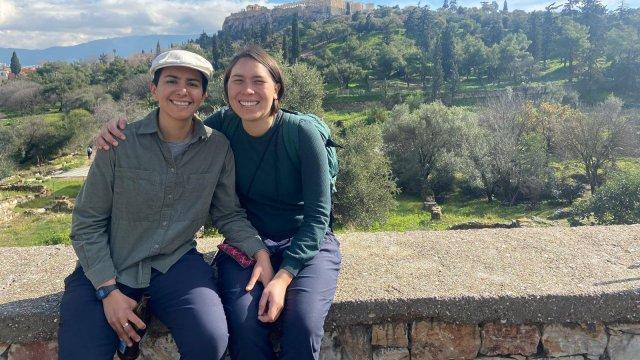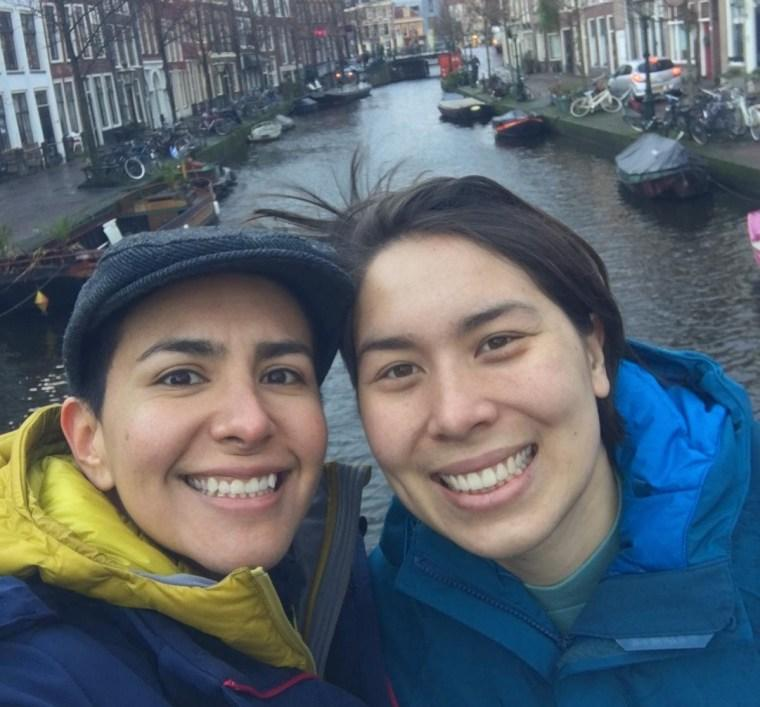I moved to the Netherlands before Brexit – it functions much better than the UK. Joanna Darrington, 34, said it was easier for her and her partner to live in the Netherlands than in the UK due to visa restrictions.

British expat Joanna Darrington (right) and her partner, Thalia Zamora, said UK visa rules for foreign partners were ‘restrictive’ (Photo: Joanna Darrington)
A British woman who moved to the Netherlands before Brexit says she may now never return to the UK, as visa rules will make it difficult for her partner to join her.
Joanna Darrington, 34, a programme manager for a charity in Amsterdam, has lived in and out of the UK for most of her life, but moved to the Netherlands in 2020 before the EU withdrawal agreement took effect.
She believes Brexit has made being British “less strong than it once was”.
“I think we’ve lost a bit of say on the world stage,” she told i. “I would like to see a change in government. I don’t know how long it’s going to take for us to rebuild but I think it’s really sad that we left the EU.”
One of the reasons Ms Darrington moved from London to Amsterdam was to be with her partner Thalia Zamora, a Mexican national who she met in Beijing where they both previously worked.
“I wanted to move back to the UK but, as a British person to come back to the UK with a foreign partner, it’s very restrictive,” Ms Darrington said. “And so in the end it was easier for us to go to the Netherlands than it was for us to come back to the UK.
“It was quite sad, actually, because I would have really liked to go back to the UK. But I’ve come to terms with the fact that it might not happen.”
Even before the Government introduced changes to the income threshold for a spouse visa it was already “expensive and complicated” to apply for one, she says. The threshold was raised from £18,600 to £29,000 on 11 April, with plans for it to rise to £38,700 in early 2025.
Ms Darrington said the Netherlands was more efficient and had better functioning systems than the UK.
“My Mexican partner makes jokes about British inefficiency,” she said. “Here in the Netherlands we have very well-functioning systems. For example, simple things like doing your taxes.”
Even voting, she says, is complex for Britons abroad. While her partner can vote in the Mexico election online or in an embassy, Ms Darrington has to use a postal vote.
In an email seen by i, Ms Darrington was informed her postal vote may arrive “between 12 and six working days before polling day” and that it must arrive by the day of the election.
“We have the right to vote but I think it will still be difficult to exercise that,” she said, adding that even getting a proxy – where a person votes on someone else’s behalf – might require a postal vote if they do not live in the same constituency.

The couple met in Beijing and now live in Amsterdam (Photo: Joanna Darrington)
Ms Darrington, who has previously voted for the Green Party, said people who live further away or in places with poor mail delivery services may have problems with a postal vote.
Bruce Darrington, chairman of the British Overseas Voters Forum, which supports for UK citizens living abroad, encouraged expats to register to vote and invited them to join the advocacy group to “collectively influence MPs and candidates, constituency by constituency, at the next election and beyond”.
“Other European countries give the right to their citizens to bring their foreign national spouse to live with them in their country automatically,” he said. “The UK is the odd one out.
“But as overseas citizens we are now at last voters and it is now in our hands to get this changed.”
A Home Office spokesperson said: ”The current levels of migration to the UK are far too high. That is why the Government announced a plan to cut the number of migrants coming to the UK by 300,000 a year – the largest reduction ever.
“Migration policy must be supportive of the wider ambition for the UK to be a high-wage and high-skill economy, which is why we have raised the minimum Income Requirement. This ensures migrants are making a net positive contribution to the UK.
Please share this story to help us raise awareness of the work of the BOVF and our Key Issues


